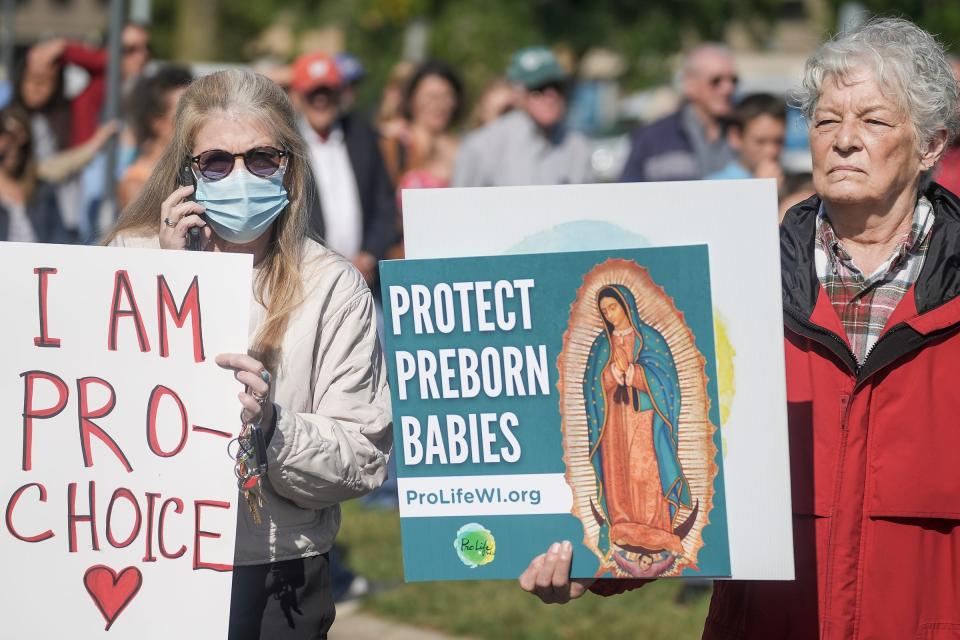How many people got abortions in 2023? New report finds increase despite bans
Abortions, particularly medication abortion, have increased in the United States in recent years despite bans prohibiting the procedure in more than a dozen states, according to a report published Tuesday.
More than a million abortions occurred in the formal U.S. healthcare system in 2023, the year after the Supreme Court overturned of Roe v. Wade, according to a monthly report from the Guttmacher Institute, a research and policy organization that supports abortion rights.
That is the highest number in more than a decade and a 10% increase since 2020, the report said. And the numbers are likely an undercount because they don't include self-managed abortions that happen outside the healthcare system.
But experts said the increase does not mean it's gotten easier to access abortion care. Rather, they said the increase in people traveling out of state indicates that financial and logistical burdens have grown for many patients and clinics that have to work harder to meet increased demand.
"Making abortion illegal does not make it less common. I think that's exactly what we're seeing," said Jennifer Kerns, a professor in the department of obstetrics, gynecology and reproductive science at the University of California, San Francisco. "What it does is it places incredible burdens on people who are going to access it and who need to access it."

What's causing the increase in abortion?
The number of abortions in the United States peaked in 1990 at 1.6 million and have been falling for several decades until the trend began to reverse in 2019. Almost every state without an abortion ban saw an increase in the number of abortions in 2023. In most states, the majority of the increase was driven by residents having more abortions, according to Isaac Maddow-Zimet, a data scientist at Guttmacher.
But an increasing amount of patients are traveling across state lines to have abortions as well, and states that shared a border with those that have enacted abortion bans - including Illinois, New Mexico, Virginia and North Carolina - saw particularly sharp increases, according to the report.
More than 160,000 people traveled out of state to have an abortion in 2023, more than double the number found in 2020, Maddow-Zimet said. Traveling to have an abortion comes with significant challenges, but abortion funds have helped make it possible and clinics have undergone what he called Herculean efforts to provide care. But, he said advocates are worried such efforts may not be sustainable.
Kerns said she provides abortions at a clinic called Trust Women in Wichita, Kansas, which has rapidly expanded the number of patients they see to absorb the need from other states.
"I routinely hear about patients who are traveling five hours, nine hours, sometimes over 12 hours, some people are flying into Wichita to access services. And these are only the people who we see," she said. "We don't see the people who maybe tried to make some attempts to travel and were unable to garner the resources, the financial resources, time off of work, assistance with childcare, all of the pieces that have to come into play for them to be able to access services outside of their state."
Medication abortion is more common than ever

Medication abortion has been increasing steadily for years, and that trend continued in 2023, Maddow-Zimet said. Approximately 642,700 medication abortions took place last year, an increase from 53% of all abortions in 2020 to 63% in 2023, according to the report.
Recent changes that have made mifepristone, one of the two drugs used in medication abortion in the United States, more accessible may be driving this increase, Kerns said. The FDA has allowed the medication to be prescribed during telehealth appointments and delivered by mail since 2021. And earlier this year, CVS and Walgreens, two of the nation's largest pharmacy chains, announced they will soon carry mifepristone in their stores.
Though medication abortion has become an integral part of abortion care in the United States, Maddow-Zimet stressed the increased access isn't sufficient to meet all patients' needs.
"It may be the only option for many people given restrictions and availability of care, but it's important to keep in mind it's not necessarily everybody's preferred method," he said. "It may be for some people, but some people prefer or need to have procedural abortions, and it's really critical that people still have that option available."
The Supreme Court is expected to hear oral arguments next week in a case that could increase restrictions on mifepristone. Maddow-Zimet said these restrictions could lead to increased demand for procedural abortions and put further strain on clinics.
"Any additional policy change, just ends up sowing more chaos and confusion both for clinics and for patients, and really ends up creating really big obstacles to care," he said. "It's hard to predict always exactly what those obstacles will be, but we know that they will cause harm."
This article originally appeared on USA TODAY: New report finds abortion numbers increased in 2023 despite bans
